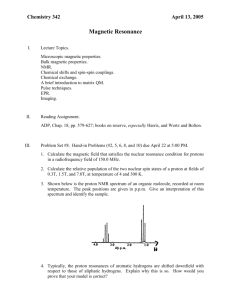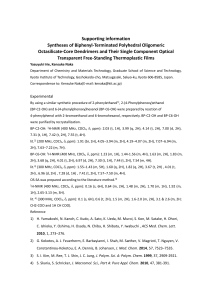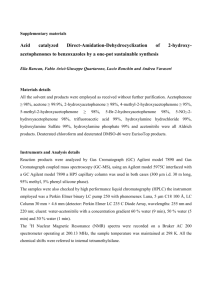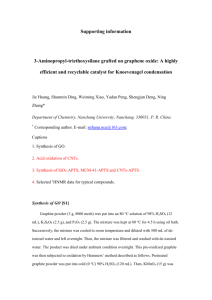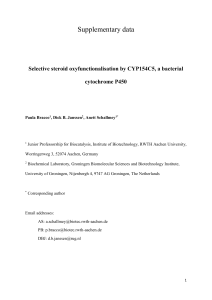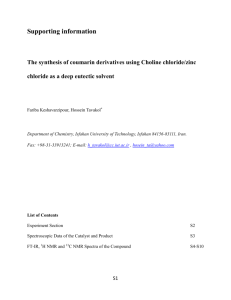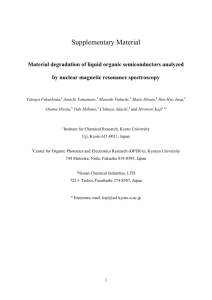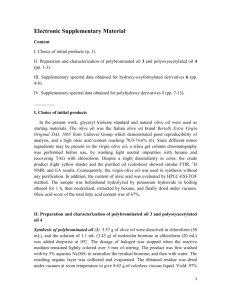TF_Template_Word_Windows_2007
advertisement
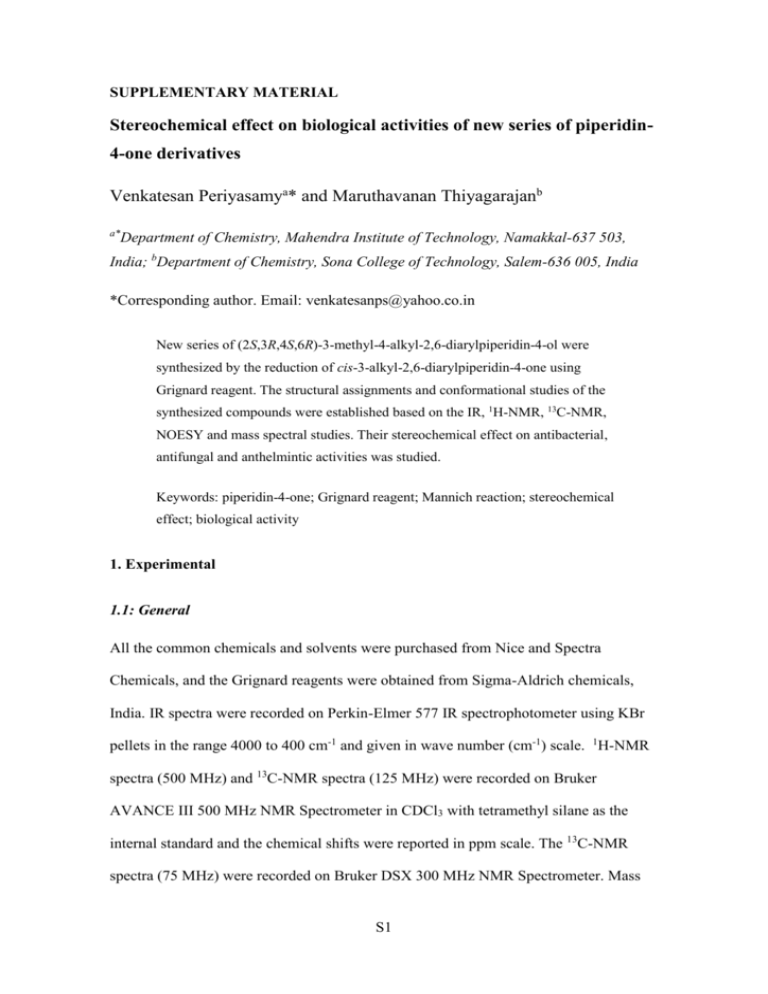
SUPPLEMENTARY MATERIAL Stereochemical effect on biological activities of new series of piperidin4-one derivatives Venkatesan Periyasamya* and Maruthavanan Thiyagarajanb a* Department of Chemistry, Mahendra Institute of Technology, Namakkal-637 503, India; bDepartment of Chemistry, Sona College of Technology, Salem-636 005, India *Corresponding author. Email: venkatesanps@yahoo.co.in New series of (2S,3R,4S,6R)-3-methyl-4-alkyl-2,6-diarylpiperidin-4-ol were synthesized by the reduction of cis-3-alkyl-2,6-diarylpiperidin-4-one using Grignard reagent. The structural assignments and conformational studies of the synthesized compounds were established based on the IR, 1H-NMR, 13C-NMR, NOESY and mass spectral studies. Their stereochemical effect on antibacterial, antifungal and anthelmintic activities was studied. Keywords: piperidin-4-one; Grignard reagent; Mannich reaction; stereochemical effect; biological activity 1. Experimental 1.1: General All the common chemicals and solvents were purchased from Nice and Spectra Chemicals, and the Grignard reagents were obtained from Sigma-Aldrich chemicals, India. IR spectra were recorded on Perkin-Elmer 577 IR spectrophotometer using KBr pellets in the range 4000 to 400 cm-1 and given in wave number (cm-1) scale. 1H-NMR spectra (500 MHz) and 13C-NMR spectra (125 MHz) were recorded on Bruker AVANCE III 500 MHz NMR Spectrometer in CDCl3 with tetramethyl silane as the internal standard and the chemical shifts were reported in ppm scale. The 13C-NMR spectra (75 MHz) were recorded on Bruker DSX 300 MHz NMR Spectrometer. Mass S1 spectra were studied using JEOL GCMATE II mass spectrometer and fragmentations were given in m/z values. The elemental analysis was done on Vario EL-III elemental analyzer and analyzed reports were within 0.4% of the theoretical values. The purity of the compounds was checked by thin layer chromatography on silica gel 60 F254 (Merck) and spots were developed using iodine vapour or ultraviolet light. The silica gel 60-120 mesh (Merck) is used for column chromatography. 1.2: General procedure of synthesis of 3-methyl-4-alkyl-2,6-diarylpiperidin-4-ol (6-15) The appropriate cis-2,6-diarylpiperidin-4-ones (1-5) (0.005 mol) was dissolved in sodium dried ether and ethyl magnesium bromide/isopropyl magnesium bromide reagent (0.01 mol) was added slowly. The mixture was refluxed until the completion of reaction. Then, it was allowed to cool and poured into the mixture of crushed ice (125 g), 100 mL of water and 10-20 ml of Conc. HCl contained in a 500 mL beaker. The hydrochloride thus obtained was filtered and dried at the pump. The dried hydrochloride was pasted with 2 or 3 drops of acetone and neutralized with aqueous ammonia followed by the addition of water. The tertiary alcohols obtained were column chromatographed from benzene-chloroform (3:1) eluent. 1.2.1: (2S,3R,4S,6R)-3-methyl-4-ethyl-2,6-diphenylpiperidin-4-ol (6) Dull white viscous oil; Rf Value: 0.75 (CHCl3-Benzene = 9:1); IR (KBr, max, cm-1): 3385 (merged, -NH and -OH), 2989 (ArCH); 1H NMR (500 MHz, CDCl3): 7.24-7.57 (m, 10H, ArH), 4.24 (dd, 3J6a,5a=13.0 Hz, 3J6a,5e=3.5 Hz, 1H, 6-Ha), 3.86 (d, 3J2a,3a=10.0 Hz, 1H, 2-Ha), 1.55 (m, 3J2a,3a=10.0 Hz, 1H, 3-Ha), 1.58-1.64 (m, 2J5a,5e=13.5 Hz, 2H, 5Ha and 5-He), 1.80-1.82 (br, 2H, NH and OH), 1.04 (m, 2H, 4-CH2CH3), 0.91 (t, 3H, 4CH2CH3), 0.91 (d, 3H, 3-CH3); 13C NMR (125 MHz, CDCl3): 64.0 (C-2), 47.9 (C-3), S2 73.6 (C-4), 42.2 (C-5), 55.2 (C-6), 33.8 (4-CH2CH3), 7.9 (4-CH2CH3), 10.0 (3-CH3); MS: m/z 295.56 (M+); Anal. Calcd. for C20H25NO: C, 81.31; H, 8.53; N, 4.74. Found: C, 81.33; H, 8.51; N, 4.77. 1.2.2: (2S,3R,4S,6R)-3-methyl-4-ethyl-2,6-di(furan-2-yl)-piperidin-4-ol (7) Pale yellow viscous oil; Rf Value: 0.48 (CHCl3-Benzene = 9:1); IR (KBr, max, cm-1): 3305 (-NH), 3412 (broad, -OH), 3118 (ArCH); 1H NMR (500 MHz, CDCl3): 7.287.36; 6.19-6.31 (m, 6H, ArH), 4.36 (dd, 3J6a,5a=11.5 Hz, 3J6a,5e=3.0 Hz, 1H, 6-Ha), 4.03 (d, 3J2a,3a=10.5 Hz, 1H, 2-Ha), 1.99 (m, 3J2a,3a=10.5 Hz, 1H, 3-Ha), 1.94 (m, 2J5a,5e=13.5 Hz, 1H, 5-Ha), 1.89 (m, 2J5a,5e=13.5 Hz, 1H, 5-He), 1.72 (br, 2H, NH and OH), 1.64 (m, 2H, 4-CH2CH3), 1.24 (t, 3H, 4-CH2CH3), 0.72 (d, 3H, 3-CH3); 13C NMR (75 MHz, CDCl3): 56.4 (C-2), 49.9 (C-3), 72.9 (C-4), 40.0 (C-5), 53.8 (C-6), 33.8 (4-CH2CH3), 8.0 (4-CH2CH3), 9.9 (3-CH3); MS: m/z 275.15 (M+); Anal. Calcd. for C16H21NO3: C, 69.79; H, 7.69; N, 5.09. Found: C, 69.78; H, 7.70; N, 5.07. 1.2.3: (2S,3R,4S,6R)-3-methyl-4-ethyl-2,6-di(4-chlorophenyl)piperidin-4-ol (8) Pale yellow viscous oil; Rf Value: 0.54 (CHCl3-Benzene = 9:1); IR (KBr, max, cm-1): 3303 (-NH), 3593 (broad, -OH), 3050 (ArCH); 1H NMR (500 MHz, CDCl3): 7.287.32 (m, 8H, ArH), 4.23 (dd, 3J6a,5a=11.3 Hz, 3J6a,5e=2.8 Hz, 1H, 6-Ha), 3.84 (d, 3 J2a,3a=10.5 Hz, 1H, 2-Ha), 1.67-1.72 (m, 2H, 3-Ha and 5-Ha), 1.77 (m, 2J5a,5e=13.7 Hz, 1H, 5-He), 1.67 (br, 2H, NH and OH), 1.60 (m, 2H, 4-CH2CH3), 0.92 (t, 3H, 4CH2CH3), 0.65 (d, 3H, 3-CH3); 13C NMR (125 MHz, CDCl3): 63.1 (C-2), 44.8 (C-3), 73.4 (C-4), 42.9 (C-5), 55.1 (C-6), 33.8 (4-CH2CH3), 7.9 (4-CH2CH3), 9.8 (3-CH3); MS: m/z 364.01 (M+); Anal. Calcd. for C20H23Cl2NO: C, 65.94; H, 6.36; N, 3.84. Found: C, 65.92; H, 6.37; N, 3.84. S3 1.2.4: (2S,3R,4S,6R)-3-methyl-4-ethyl-2,6-di(4-methoxyphenyl)piperidin-4-ol (9) Pale yellow viscous oil; Rf Value: 0.78 (CHCl3-Benzene = 9:1); IR (KBr, max, cm-1): 3304 (-NH), 3394 (broad, -OH), 3049 (ArCH); 1H NMR (500 MHz, CDCl3): 7.087.13 (m, 8H, ArH), 4.06 (dd, 3J6a,5a=12.5 Hz, 3J6a,5e=2.0 Hz, 1H, 6-Ha), 3.60 (d, 3 J2a,3a=10.0 Hz, 1H, 2-Ha), 3.84, 3.82 (s, 6H, Ar-OCH3), 2.68 (m, 3J2a,3a=10.0 Hz, 1H, 3- Ha), 2.74 (m, 2J5a,5e=13.0 Hz, 1H, 5-Ha), 2.62 (m, 2J5a,5e=13.0 Hz, 1H, 5-He), 1.88 (br, 2H, NH and OH), 1.47 (m, 2H, 4-CH2CH3), 1.09 (t, 3H, 4-CH2CH3), 0.87 (d, 3H, 3CH3); 13C NMR (125 MHz, CDCl3): 67.9 (C-2), 51.8 (C-3), 74.1 (C-4), 43.8 (C-5), 61.0 (C-6), 34.2 (4-CH2CH3), 7.9 (4-CH2CH3), 10.2 (3-CH3), 55.3 (OCH3); MS: m/z 355.80 (M+); Anal. Calcd. for C22H29NO3: C, 74.33; H, 8.22; N, 3.94. Found: C, 74.32; H, 8.20; N, 3.95. 1.2.5: (2S,3R,4S,6R)-3-methyl-4-ethyl-2,6-di(4-methylphenyl)piperidin-4-ol (10) Pale yellow viscous oil; Rf Value: 0.76 (CHCl3-Benzene = 9:1); IR (KBr, max, cm-1): 3280 (-NH), 3391 (broad, -OH), 3026 (ArCH); 1H NMR (500 MHz, CDCl3): 7.107.23 (m, 8H, ArH), 4.04 (dd, 3J6a,5a=12.5 Hz, 3J6a,5e=2.0 Hz, 1H, 6-Ha), 3.58 (d, 3 J2a,3a=10.0 Hz, 1H, 2-Ha), 2.29 (m, 3J2a,3a=10.0 Hz, 1H, 3-Ha), 2.40 (m, 2J5a,5e=13.0 Hz, 1H, 5-Ha), 2.33 (m, 2J5a,5e=13.0 Hz, 1H, 5-He), 2.23; 2.24 (t, 6H, Ar-CH3), 1.71-1.72 (br, 2H, NH and OH), 1.01 (m, 2H, 4-CH2CH3), 1.31 (t, 3H, 4-CH2CH3), 0.68 (d, 3H, 3CH3); 13C NMR (75 MHz, CDCl3): 65.2 (C-2), 49.8 (C-3), 74.0 (C-4), 42.8 (C-5), 58.2 (C-6), 33.9 (4-CH2CH3), 7.9 (4-CH2CH3), 21.2 (CH3); MS: m/z 323.10 (M+); Anal. Calcd. for C22H29NO: C, 81.69; H, 9.04; N, 4.33. Found: C, 81.68; H, 9.06; N, 4.34. 1.2.6: (2S,3R,4S,6R)-3-methyl-4-(propan-2-yl)-2,6-diphenylpiperidin-4-ol (11) Orange yellow viscous oil; Rf Value: 0.57 (CHCl3-Benzene = 9:1); IR (KBr, max, cm-1): S4 3311 (-NH), 3410 (Broad, -OH), 3068 (ArCH); 1H NMR (500 MHz, CDCl3): 7.437.50 and 7.24-7.34 (m, 8H, ArH), 4.27 (dd, 3J6a,5a=11.5 Hz, 3J6a,5e=3.0 Hz, 1H, 6-Ha), 3.91 (d, 3J2a,3a=10.0 Hz, 1H, 2-Ha), 1.80 (dd, 2J5a,5e=12, 1H, 5-He), 1.75 (m, 1H, 5-Ha), 1.68 (m, 1H, 3-Ha), 1.31 and 1.29 (br, 2H, NH and OH), 0.98 and 0.94 (d, 6H, 4-CH3), 0.87 (m, 1H, 4-CH), 0.65 (t, 3H, 3-CH3); 13C NMR (125 MHz, CDCl3): 63.9 (C-2), 45.2 (C-3), 75.5 (C-4), 41.5 (C-5), 56.8 (C-6), 35.1 (4-CH(CH3)2), 17.5 and 16.2 (4CH(CH3)2), 9.5 (3-CH3); MS: m/z 309.45 (M+); Anal. Calcd. for C21H27NO: C, 81.51; H, 8.79; N, 4.53. Found: C, 81.52; H, 8.77; N, 4.52. 1.2.7: (2S,3R,4S,6R)-3-methyl-4-(propan-2-yl)-2,6-di(furan-2-yl)piperidin-4-ol (12) Dark brown viscous oil; Rf Value: 0.59 (CHCl3-Benzene = 9:1); IR (KBr, max, cm-1): 3350 (merged, -NH and -OH), 3118 (ArCH); 1H NMR (500 MHz, CDCl3): 7.28-7.55 and 6.21-6.39 (m, 6H, ArH), 4.21 (dd, 3J6a,5a=12.3 Hz, 3J6a,5e=3.3 Hz, 1H, 6-Ha), 3.83 (d, 1H, 2-Ha), 1.80 (m, 3H, 3-Ha, 5-Ha and 5-He), 1.27 (br, 2H, NH and OH), 1.15 and 1.08 (d, 6H, 4-CH3), 0.96 (m, 1H, 4-CH), 0.70 (t, 3H, 3-CH3); 13C NMR (125 MHz, CDCl3): 60.8 (C-2), 49.9 (C-3), 75.0 (C-4), 39.7 (C-5), 54.1 (C-6), 35.1 (4-CH(CH3)2), 17.4 and 16.1 (4-CH(CH3)2), 9.5 (3-CH3); MS: m/z 289.79 (M+); Anal. Calcd. for C17H23NO3: C, 70.56; H, 8.01; N, 4.84. Found: C, 70.55; H, 8.03; N, 4.85. 1.2.8: (2S,3R,4S,6R)-3-methyl-4-(propan-2-yl)-2,6-di(4-chlorophenyl)piperidin-4ol (13) Orange yellow viscous oil; Rf Value: 0.44 (CHCl3-Benzene = 9:1); IR (KBr, max, cm-1): 3305 (-NH), 3591 (broad, -OH), 3020 (ArCH); 1H NMR (500 MHz, CDCl3): 7.357.44 and 7.28-7.32 (m, 8H, ArH), 4.21 (dd, 3J6a,5a=11.5 Hz, 3J6a,5e=3.0 Hz, 1H, 6-Ha), 3.87 (d, 3J2a,3a=10.0 Hz, 1H, 2-Ha), 1.68 (m, 1H, 3-Ha), 1.80 (m, 1H, 5-Ha), 1.73 (dd, S5 2 J5a,5e=12, 1H, 5-He), 1.85 (br, 2H, NH and OH), 0.83 and 0.77 (d, 6H, 4-CH3), 0.94 (m, 1H, 4-CH), 0.62 (t, 3H, 3-CH3); 13C NMR (125 MHz, CDCl3): 63.1 (C-2), 45.3 (C-3), 75.2 (C-4), 41.8 (C-5), 55.0 (C-6), 35.1 (4-CH(CH3)2), 17.4 and 16.2 (4-CH(CH3)2), 9.3 (3-CH3); MS: m/z 377.34 (M+); Anal. Calcd. for C21H25Cl2NO: C, 66.67; H, 6.66; N, 3.70. Found: C, 66.66; H, 6.68; N, 3.71. 1.2.9: (2S,3R,4S,6R)-3-methyl-4-(propan-2-yl)-2,6-di(4-methoxyphenyl)piperidin4-ol (14) Pale yellow viscous oil; Rf Value: 0.70 (CHCl3-Benzene = 9:1); IR (KBr, max, cm-1): 3321 (-NH), 3396 (broad, -OH), 3060 (ArCH); 1H NMR (500 MHz, CDCl3): 7.357.44 and 7.28-7.32 (m, 8H, ArH), 4.21 (dd, 3J6a,5a=11.5 Hz, 3J6a,5e=3.0 Hz, 1H, 6-Ha), 3.87 (d, 3J2a,3a=10.0 Hz, 1H, 2-Ha), 1.68 (m, 1H, 3-Ha), 1.80 (m, 1H, 5-Ha), 1.73 (dd, 2 J5a,5e=12, 1H, 5-He), 1.85 (br, 2H, NH and OH), 0.83 and 0.77 (d, 6H, 4-CH3), 0.94 (m, 1H, 4-CH), 0.62 (t, 3H, 3-CH3); 13C NMR (125 MHz, CDCl3): 63.1 (C-2), 44.8 (C-3), 73.4 (C-4), 43.0 (C-5), 56.2 (C-6), 33.9 (4-CH(CH3)2), 17.5 and 16.2 (4-CH(CH3)2), 9.2 (3-CH3), 53.9 (OCH3); MS: m/z 369.34 (M+); Anal. Calcd. for C23H31NO3: C, 74.76; H, 8.46; N, 3.79. Found: C, 74.78; H, 8.45; N, 3.78. 1.2.10: (2S,3R,4S,6R)-3-methyl-4-(propan-2-yl)-2,6-di(4-methylphenyl)piperidin4-ol (15) Orange yellow viscous oil; Rf Value: 0.33 (CHCl3-Benzene = 9:1); IR (KBr, max, cm-1): 3315 (-NH), 3420 (broad, -OH), 3020 (ArCH); 1H NMR (500 MHz, CDCl3): 7.377.41 and 7.15-7.21 (m, 8H, ArH), 4.09 (dd, 3J6a,5a=11.5 Hz, 3J6a,5e=3.0 Hz, 1H, 6-Ha), 3.62 (d, 3J2a,3a=10.0 Hz, 1H, 2-Ha), 2.40 and 2.36 (m, 6H, ArCH3), 1.68 (dd, 2J5a,5e=12, 1H, 5-He), 1.99 (m, 1H, 5-Ha), 1.79 (m, 1H, 3-Ha), 1.31 and 1.26 (br, 2H, NH and OH), 0.89 and 0.85 (d, 6H, 4-CH3), 0.96 (m, 1H, 4-CH), 0.66 (t, 3H, 3-CH3); 13C NMR (75 S6 MHz, CDCl3): 63.1 (C-2), 44.8 (C-3), 73.4 (C-4), 43.0 (C-5), 56.2 (C-6), 33.9 (4CH(CH3)2), 17.5 and 16.2 (4-CH(CH3)2), 9.2 (3-CH3), 53.9 (OCH3); MS: m/z 337.09 (M+); Anal. Calcd. for C23H31NO: C, 81.85; H, 9.26; N, 4.15. Found: C, 81.87; H, 9.27; N, 4.13. 1.3: Pharmacology The in vitro antibacterial and in vitro antifungal activity of the synthesized compounds were evaluated using the agar diffusion method (Maruthavanan & Venkatesan 2013). The in vitro antibacterial activity was evaluated against Gram-positive bacteria such as Bacillus subtilis (B. subtilis) and Staphylococcus aureus (S. aureus), and Gram-negative bacteria such as Escherichia coli (E. coli) and Salmonella typhi (S. typhi). Similarly, the in vitro antifungal activity was evaluated against pathogenic fungi such as Aspergillus flavus (A. flavus), Aspergillus niger (A. niger), Penicillium chrysogenum (P. chrysogenum) and Fusarium moniliforme (F. moniliforme). The in vitro anthelmintic studies were carried out against three different species of earthworms known as Megascoplex konkanensis, Pontoscotex corethruses and Eudrilus eugeniea at 2 mg/mL concentration as reported already (Maruthavanan & Venkatesan 2013). S7 Figure S1.1: IR Spectrum of 6 Figure S1.2: NOESY Spectrum of 6 S8 Table S1. NOESY correlation data of compound 6 Signals Group ( in ppm) Correlations in the NOESY Signals Group ( in ppm) C(3)-CH3 0.65 C(2)-Ha 3.86 C(4)-CH2CH3 1.04 C(3)-Ha 1.58-1.64 C(5)-Ha 1.52-1.73 C(4)-OH 1.82 C(5)-He 1.58-1.64 C(4)-CH2CH3 0.91 C(3)-Ha 1.55 C(5)-Ha 1.58-1.64 C(2)-Ha 3.86 C(3)-CH3 0.65 C(6)-Ha 4.24 C(4)-OH 1.82 C(4)-OH 1.82 C(5)-He 1.58-1.64 C(6)-Ha 4.24 Figure S1.3: 1H-NMR Spectrum of 6 (Expanded) S9 Figure S1.4: 13C-NMR Spectrum of 6 Figure S2.1: IR Spectrum of 7 S10 Figure S2.2: 1H-NMR Spectrum of 7 (Expanded) Figure S2.3: 13C-NMR Spectrum of 7 S11 Figure S3.1: IR Spectrum of 8 Figure S3.2: 1H-NMR Spectrum of 8 (Expanded) S12 Figure S3.3: 13C-NMR Spectrum of 8 Figure S4.1: IR Spectrum of 9 S13 Figure S4.2: 1H-NMR Spectrum of 9 (Expanded) Figure S4.3: 13C-NMR Spectrum of 9 S14 Figure S5.1: IR Spectrum of 10 Figure S5.2: 1H-NMR Spectrum of 10 (Expanded) S15 Figure S5.3: 13C-NMR Spectrum of 10 Figure S6.1: IR Spectrum of 11 S16 Figure S6.2: 1H-NMR Spectrum of 11 (Expanded) S17 Figure S6.3: 13C-NMR Spectrum of 11 Figure S7.1: IR Spectrum of 12 S18 Figure S7.2: 1H-NMR Spectrum of 12 (Expanded) Figure S7.3: 13C-NMR Spectrum of 12 S19 Figure S8.1: IR Spectrum of 13 Figure S8.2: 13C-NMR Spectrum of 13 S20 Figure S8.3: 1H-NMR Spectrum of 13 (Expanded) S21 Figure S9.1: IR Spectrum of 14 Figure S9.2: 13C-NMR Spectrum of 14 S22 Figure S9.3: 1H-NMR Spectrum of 14 (Expanded) S23 Figure S10.1: IR Spectrum of 15 Figure S10.2: 1H-NMR Spectrum of 15 (Expanded) S24 Figure S10.3: 13C-NMR Spectrum of 15 References: Maruthavanan T, Venkatesan P. 2013. Synthesis of 4-hydroxy-3,4-dialkyl-2,6diarylpiperidine derivatives as potent antimicrobial agent. Nat Prod Res. 27:238–245. S25

